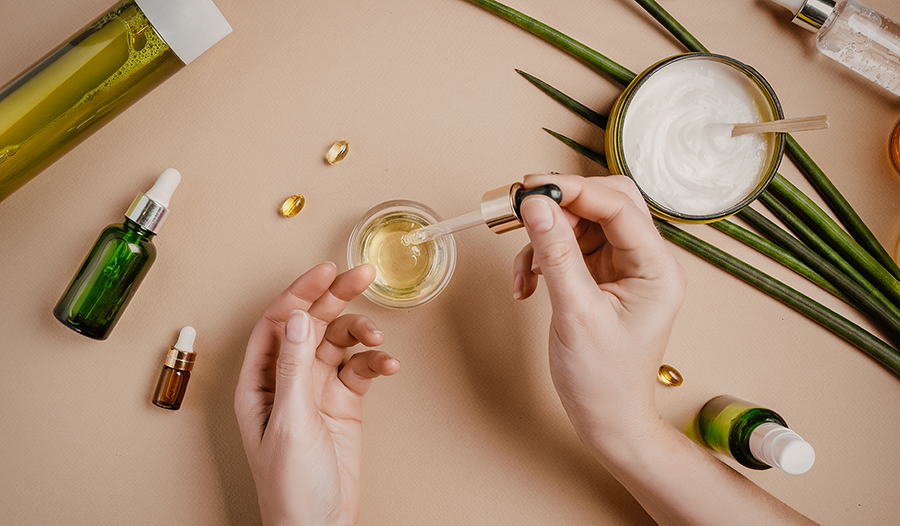4 kulcsfontosságú antioxidáns az erős bőr mikrobiómájához

Mi az a bőr mikrobióma?
A bőr a test legnagyobb szerve. A szervezet fizikai akadályaként működik az idegen szervezetek vagy káros anyagok károsodása ellen.
A bőr mikrobiómája sokféle mikroorganizmusból áll, beleértve a baktériumokat, vírusokat és még gombákat is. Ezek többsége ártalmatlan, és szimbiotikus kapcsolatot teremt velünk, olyan kulcsfontosságú funkciókat biztosítva, mint például az illatunk segítése, sőt immunrendszerünk erősítése is.
A bőr és a komplex mikrobiom egészségének megőrzése az elfogyasztott tápanyagoktól és a körülötted lévő környezettől függ.
A bőr anatómiája
A bőrnek három rétege van, beleértve az epidermiszt is, amely fokozatosan elrendezett, teljesen érett bőrsejtekből áll. Ez biztosítja az első védelmi réteget, mivel több millió csíra lakik ott tökéletes egyensúlyban.
A kissé mélyebb bőrrétegben verejtékmirigyek, olajmirigyek és szőrtüszők találhatók, valamint apró erek, amelyek tápanyagokat szállítanak és hulladékot szállítanak a bőr felső rétegébe és onnan.
Ezek különféle baktériumokat is tartalmaznak, beleértve a baktériumokat és gombákat, és ezek biztosítják ezt az illatot edzés vagy izzadás közben. A legmélyebb szint, amely elsősorban zsírszövetből áll, a szubkután réteg, ahol nagyobb erek találhatók. Kevesebb mikroorganizmus található itt, de ez a rész elengedhetetlen a bőr turgorához.
A táplálkozás tükröződik a bőrön, mivel a bőr tükrözi a test jólétét. A kiegyensúlyozott mikrobióma fenntartása fontos, mivel ez a szimbiotikus kapcsolat segít a bőr egészségének megjelenésében. A tápanyagok hiánya ahhoz vezethet, hogy ezek a mikroorganizmusok több kárt okoznak, mint hasznot.
Bőrhidratálás
A bőr hidratálása elengedhetetlen a rugalmassághoz, mivel a sejtek több mint 50% -a vízből áll. A kiszáradt bőr száraznak, pelyhesnek és feszesnek tűnhet. Viszkető és repedt bőrt is okozhat, lehetővé téve a baktériumok számára, hogy behatoljanak az ép gáton, ami olyan bőrfertőzésekhez vezet, mint a cellulitisz. Ezenkívül rugalmasságának és feszességének fenntartása érdekében a kiszáradt bőr jelzi az olajmirigyeknek, hogy több olajat szabadítanak fel, ami eltömődött pórusokhoz vezethet, amelyek megfertőződhetnek.
Tudni fogja, hogy megfelelően hidratált-e, ha ritkán szomjas vagy a vizelete színtelen vagy világossárga színű. Néhány embernek szüksége lehet néhány pohár vízre, másoknak pedig akár 15 pohárra is szükségük lehet. Mindez az Ön aktivitási szintjétől függ. Maga a víz enyhe ízű lehet, így a vízaromák nagyszerű módja annak, hogy csavarodjon a napi vízfogyasztáshoz.
Tiszta bőr fenntartása
Ugyanolyan fontos, mint a bőr hidratálása sok víz ivásával, ugyanúgy fontos, hogy a felület tiszta és száraz legyen. A felesleges nedvesség a baktériumok és gombák túlnövekedéséhez vezethet, amelyek helyi bőrfertőzéseket okozhatnak. Ez különösen fontos az izzadás után, mivel a sarkokban lévő nedvesség általában nagy súrlódást mutat, és kevésbé jut hozzá a fényhez, ami baktériumok és gombák túlnövekedéséhez vezet. Ez olyan gombás fertőzésekhez vezethet, mint a ógyűrűs féreg, a bőr candida és a sportolók lába, hogy néhányat említsünk. Ezért fontos, hogy a bőr felületét szárazon tartsa, és viseljen nedvességelvezető anyagot, például mikromodált és pamutot.
A kezek tisztán tartása szintén elengedhetetlen a bőr egészségéhez, mivel így érjük el a külvilágot és kapcsolatba lépünk vele. Átlagosan óránként több mint tízszer érintjük velük az arcunkat. Ezért fontos, hogy legalább 20 másodpercig gyakran mosson kezet antibakteriális szappannal és vízzel. Ha a szappan és a víz nem áll rendelkezésre könnyen, használjon kézfertőtlenítőt , legalább 60% alkoholt tartalmazó.
Győződjön meg arról, hogy kézfertőtlenítő használatakor használjon illatmentes hidratáló krémet is , mivel az alkohol száraz és repedt bőrhez vezethet, majd irritált bőrhez vezethet, és elősegítheti a kisebb helyi bőrfertőzéseket.
Fehérjék fontosak a bőr számára
A bőr mikrobiómájának erős alapokra van szüksége a virágzáshoz. A bőr alapja kollagénből áll, amely az emberi test legelterjedtebb fehérje. Ez a fehérje is felelős a bőr szerkezetéért, szilárdságáért és szilárdságáért. A bőr normál öregedési károsodása visszafordítható kollagénkiegészítéssel.
Lenyeléskor a kollagénkiegészítés elősegítheti a bőr hidratáltságát és rugalmasságát, mivel a fehérje lebomlik a fő építőelemekre, és lerakódik a bőrben. A placebóval összehasonlítva a kollagénkiegészítés még a szemráncok megjelenésének csökkentésében is segíthet. Az ajánlott napi bevitel változó, a tanulmányok szerint napi 1,5—2,5 gramm, néhányuk akár napi 10 grammra is megy.
4 Kulcsfontosságú antioxidánsok a bőrre
Bőrünk nagy mennyiségű oxidatív stressznek van kitéve, főként az UV fénynek való kitettségből, de a szokásos anyagcsere-reakciókból és a kozmetikumokból is. Bőr mikrobiománkat finom egyensúlyban tartják, ahol a túl sok oxidatív stressz egészségtelen bőrhez és még gyorsabb öregedéshez vezethet. Ezért fontos olyan étrend fogyasztása, amely antioxidánsokban gazdag és tele van a következő vitaminokkal.
C-vitamin és öregedésgátló
A C-vitamin az egészséges emberi étrend nélkülözhetetlen eleme, mert a szervezet nem tudja előállítani. A C-vitamin friss gyümölcsökben, citrusfélékben és sok chili paprikában található. A C-vitamin hasznos lehet a helyi szérumokban , mivel ez a kollagénfehérje fő összetevője, amely a bőrön található. Segíthet a bőr elszíneződésében és az öregedésgátló napvédelemben. Szájon át a C-vitamin antioxidánsként segít, és előnyökkel járhat a bőrsejtek szabad gyökök által okozott károsodásának megelőzésében.
Az E-vitamin védő hatásai
Az E-vitamin egy másik antioxidáns vitamin, amely segíthet az öregedésgátló hatásokban azáltal, hogy megvédi a kollagénfehérjét, valamint a bőrréteg alatti zsírszövetet. Megtalálható a sáfrányolajban, a kukoricában, a szójában és bizonyos húsokban. Az E- és C-vitamin szinergikusan működhet, és segíthet stabilizálni a sejtkárosodást, amely akkor következik be, amikor a test szabadban UV-sugárzásnak van kitéve.
A-vitamin és napvédelem
Az A-vitamin karotinoidok néven ismert származékokból származik, beleértve a béta-karotint, a likopint és a retinolt. Rendkívül hatékony antioxidánsok, és kimutatták, hogy védenek a napkárosodástól. Béta-karotin megtalálható sárgarépában, sütőtökben, édesburgonyában, mangóban és papayában. A béta-karotinnal történő kiegészítés segíthet csökkenteni a bőrégések súlyosságát a túl sok napsugárzás után.
A likopin, ellentétben a béta-karotinnal, vöröses színű gyümölcsökben található, például paradicsomban, görögdinnyében vagy más vörös gyümölcsökben. Ha túlzott UV-fénynek van kitéve, a likopin elpusztul elsőként, így a kiegészítés segíthet megelőzni a további napkárosodást.
A retinol egy másik fontos karotinoid az emberi test számára, mivel a test nem tud szintetizálni. Alapvető fontosságú az új bőrsejtek növekedéséhez és a bőr felső rétegeinek fenntartásához. Az étrendben megtalálható zsíros ételekben, beleértve a tejet, a tojássárgáját, a sajtot és a zsíros sajtot. A retinol orális és helyi változatai egyaránt segíthetnek elkerülni a fejlett bőröregedést, amely túl sok napsugárzás esetén figyelhető meg.
D-vitamin és gyulladás
Az emberi test elsősorban napsugárzás útján állíthatja elő saját D-vitamint , mivel a bőr a szintézisének fő helye. A D-vitamin számos szerepet játszik az emberi testben, beleértve az immunválasz elősegítését és a gyulladás szabályozását.
Ahogy a test öregszik, csökken a szervezet D-vitamin-termelési képessége, ezért a kiegészítés kulcsfontosságú, különösen, ha hosszabb ideig bent van. Az Amerikai Dermatológiai Akadémia legalább 200 NE -t javasol felnőtteknek és nagyobb, 400 NE adagot az 50 év felettiek számára. A D-vitamin biztonságos szintje legfeljebb 10 000 NE - 40 000 NE naponta.
Növényi antioxidánsok a bőrre
A zöld tea kimutatták, hogy bizonyos előnyökkel jár a bőr egészségére nézve. Kimutatták, hogy a zöld teát tartalmazó helyi készítmények javítják a bőr rugalmasságát. Segíthet megelőzni a túlzott napkárosodás okozta károsodást is.
Kurkumin, a kurkumafő összetevője, oxidatív stressz révén támogathatja a testet. Fűszerként hozzáadható kedvenc ételeihez, tejteaként is fogyasztható, és kiegészítőként is bevehető. A gyulladást segítő fűszerek hasznosak lehetnek a krónikus gyulladásos bőrbetegségben szenvedők számára.
A probiotikumok hasznosak lehetnek a bőrnek?
A bél mikroflórájához hasonlóan a bőr mikrobiomája is állandó egyensúlyban van. Feltételezték, hogy a probiotikumokkal, különösen a bélrendszer természetes lakóival rendelkező laktobacillusokkal és enterococcusokkal történő kiegészítése bizonyos egészségügyi előnyökkel járhat a bőr mikrobiómájának. Tanulmányok azt mutatják, hogy az egészséges bél mikrobióma befolyásolhatja az immunválaszt és csökkentheti a gyulladást, ami csökkentheti a bőrfertőzések, például pattanások kialakulásának esélyét, valamint más krónikus gyulladással összefüggő bőrbetegségek tüneteit.
Ne feledje, hogy a testednek, a bőrödnek és a bőr mikrobiomjának egészséges egyensúlyra van szüksége. A vitaminokkal és antioxidánsokkal teli egészséges táplálkozás segít megerősíteni a bőrt és megőrizni a mikrobiómát. A gyakori kézmosás biztonságban fogja Önt és szeretteit. Végül ne felejtse el szárazon tartani a bőr felületét hidratálás közben, hogy a bőr fiatalnak és egészségesnek tűnjön.
Referenciák:
- Andersson T., Ertürk Bergdahl G., Saleh K. és mtsai. A gyakori bőrbaktériumok megvédik gazdájukat az oxidatív stressztől a kiválasztott antioxidáns RoxP révén. Tudományos jelentések, 2019; 9 (1). doi: 10.1038/s41598-019-40471-3
- Bolke L., Schlippe G, Gerß J, Voss W. A kollagénkiegészítő javítja a bőr hidratáltságát, rugalmasságát, érdességét és sűrűségét: egy randomizált, placebo-kontrollos, vak vizsgálat eredményei. Tápanyagok. 2019; 11 (10) :2494. doi: 10.3390/nu11102494
- Grice EA, Segre JA. A bőr mikrobióma [közzétett korrekció megjelenik a Nat Rev Microbiol-ban. 2011 augusztus; 9 (8) :626]. Nat Rev Microbiol. 2011; 9 (4) :244-253. doi: 10.1038/nrmicro2537
- Prescott SL, Larcombe DL, Logan AC és mtsai. A bőr mikrobióma: a modern környezet hatása a bőr ökológiájára, a gátintegritásra és a szisztémás immunprogramozásra. Világallergia szerv J. 2017; 10 (1) :29. doi: 10.1186/s40413-017-0160-5
- Bolke L, Schlippe G, Gerß J, Voss W. A kollagénkiegészítő javítja a bőr hidratáltságát, rugalmasságát, érdességét és sűrűségét: egy randomizált, placebo-kontrollos, vak vizsgálat eredményei. Tápanyagok. 2019; 11 (10) :2494. doi:10.3390/nu11102494
- Schagen SK, Zampeli VA, Makrantonaki E, Zouboulis CC. A táplálkozás és a bőr öregedése közötti kapcsolat felfedezése. Dermatoendokrinol. 2012; 4 (3) :298-307. doi: 10.4161/derm.22876
- Víz: Mennyit kell inni minden nap? https://www.mayoclinic.org/healthy-lifestyle/nutrition-and-healthy-eating/in-depth/water/art-20044256. Megjelent 2017. szeptember 6-án. Hozzáférés: 2020. szeptember 14.
FELELŐSSÉGKIZÁRÓ NYILATKOZAT:A jelen blognak nem célja diagnózis felállítása...

















































































 Tartalomjegyzék
Tartalomjegyzék


